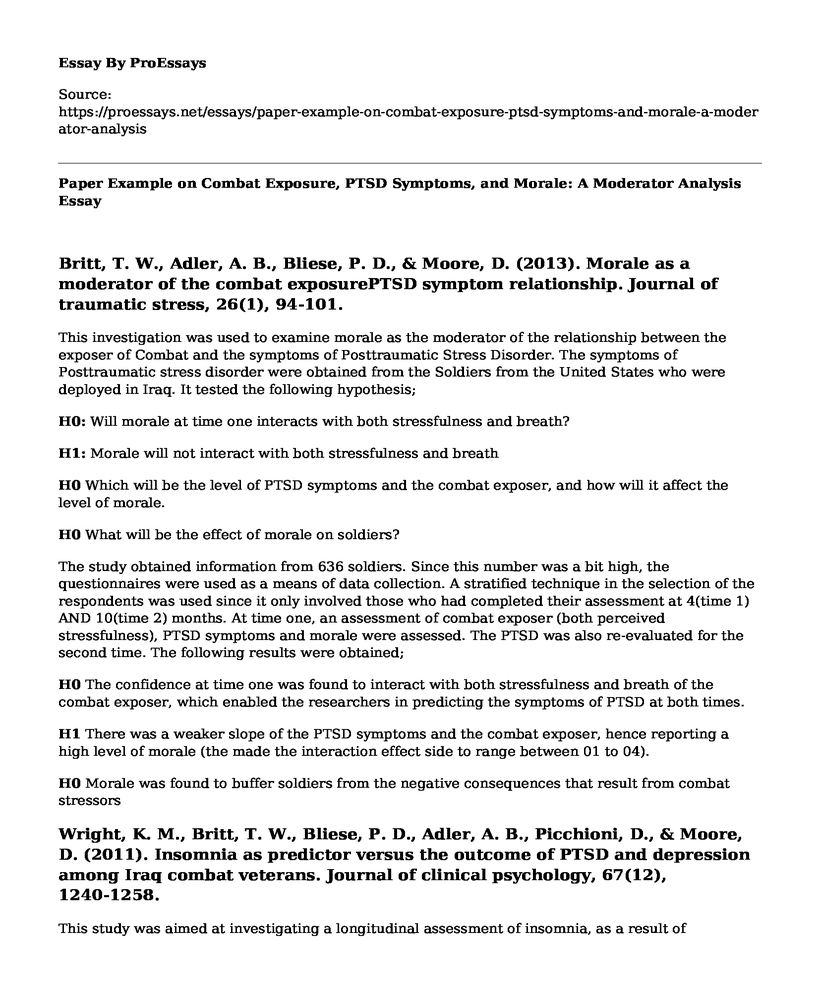Britt, T. W., Adler, A. B., Bliese, P. D., & Moore, D. (2013). Morale as a moderator of the combat exposurePTSD symptom relationship. Journal of traumatic stress, 26(1), 94-101.
This investigation was used to examine morale as the moderator of the relationship between the exposer of Combat and the symptoms of Posttraumatic Stress Disorder. The symptoms of Posttraumatic stress disorder were obtained from the Soldiers from the United States who were deployed in Iraq. It tested the following hypothesis;
H0: Will morale at time one interacts with both stressfulness and breath?
H1: Morale will not interact with both stressfulness and breath
H0 Which will be the level of PTSD symptoms and the combat exposer, and how will it affect the level of morale.
H0 What will be the effect of morale on soldiers?
The study obtained information from 636 soldiers. Since this number was a bit high, the questionnaires were used as a means of data collection. A stratified technique in the selection of the respondents was used since it only involved those who had completed their assessment at 4(time 1) AND 10(time 2) months. At time one, an assessment of combat exposer (both perceived stressfulness), PTSD symptoms and morale were assessed. The PTSD was also re-evaluated for the second time. The following results were obtained;
H0 The confidence at time one was found to interact with both stressfulness and breath of the combat exposer, which enabled the researchers in predicting the symptoms of PTSD at both times.
H1 There was a weaker slope of the PTSD symptoms and the combat exposer, hence reporting a high level of morale (the made the interaction effect side to range between 01 to 04).
H0 Morale was found to buffer soldiers from the negative consequences that result from combat stressors
Wright, K. M., Britt, T. W., Bliese, P. D., Adler, A. B., Picchioni, D., & Moore, D. (2011). Insomnia as predictor versus the outcome of PTSD and depression among Iraq combat veterans. Journal of clinical psychology, 67(12), 1240-1258.
This study was aimed at investigating a longitudinal assessment of insomnia, as a result of posttraumatic stress disorders (PTSD), as well as the symptoms of depression among combat veterans. It used two-time points of post-deployment together with a combination with a structural equation of modelling in examining the relative strengths of the two directions of predictions. These were; the symptoms of psychology as the predictor of insomnia and vice versa. Therefore, the following hypotheses were tested by the study;
H0: Does insomnia predict psychological symptoms, or does psychological symptoms predict insomnia?
H1: The relationship between psychological symptoms and insomnia about different times and periods
The study used 659 respondents to give relevant information. These were all soldiers in a combat team of a brigade, who were assessed four months after returning from 12 months deployment to Iraq. The assessment was later repeated after eight months. After these investigations, the following results were obtained;
H0: The psychological symptoms and insomnia were associated with both times and periods.
H1: At the post-deployment of four months, insomnia was a critical predictor of change in PTSD and depression. The PTSD and depression at the post-deployment at 12 months were not significant predictors of insomnia changes.
These results supported the role of insomnia in the development of the additional psychological problems, as well as in highlighting various clinical implications for the combat veterans.
References
Wright, K. M., Britt, T. W., Bliese, P. D., Adler, A. B., Picchioni, D., & Moore, D. (2011). Insomnia as predictor versus the outcome of PTSD and depression among Iraq combat veterans. Journal of clinical psychology, 67(12), 1240-1258.
Britt, T. W., Adler, A. B., Bliese, P. D., & Moore, D. (2013). Morale as a moderator of the combat exposurePTSD symptom relationship. Journal of traumatic stress, 26(1), 94-101.
Cite this page
Paper Example on Combat Exposure, PTSD Symptoms, and Morale: A Moderator Analysis. (2023, Apr 08). Retrieved from https://proessays.net/essays/paper-example-on-combat-exposure-ptsd-symptoms-and-morale-a-moderator-analysis
If you are the original author of this essay and no longer wish to have it published on the ProEssays website, please click below to request its removal:
- Personal Essay
- Hellen's Depression Case Analysis - Case Study Example
- Trauma Among Victims of Terrorism: Psychological Paper Example
- Patients Psychiatry Interview Example
- Essay on Prosperity via Fictitious or Honest Means: Reality Life's Unconditional Wedge
- Developing Employability Skills: A Self-Assessment for the Role of Voluntary Witness Support Worker
- The Right Age for Drinking or Smoking Onset - Essay Sample







